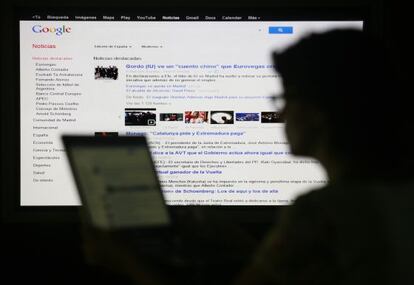Pay and display
Spanish press applauds Germany's "Google law" Legislation would force search engines to shell out for using news story summaries

Relations between the big internet search engines and newspapers have always been tense. But that tension could become outright hostility as German seeks to pass the so-called "Google law," which would force big commercial search engines, such as the US giant, to pay newspapers and magazines for using their summaries of news stories.
Spanish media companies, along with their French counterparts, have welcomed the German initiative and hope to reach agreements like the one Google signed five years ago with French news agency AFP after it sued the search engine for reproducing its articles and photos.
German Justice Minister Sabine Leutheusser-Schnarrenberger of the liberal Free Democratic Party says the law will allow "publishers to receive an appropriate part of the earnings" that search engines obtain when they use fragments of other companies' content.
Google, on the other hand, says the law "endangers" all internet users because it will "massively" slow down searches.
Various internet users' groups, meanwhile, say the law will restrict freedom of expression.
The search engines "need to value journalistic work," says one publisher
The text of the bill is now with the German federal parliament, pending a vote and possible amendments. It proposes recognizing the right of publishers to demand payments for the use of part of their articles in news search engines such as Google News. The draft of the bill specifies that it will only affect profit-making internet portals and aggregators that "systematically" serve up editorial content from third parties. Private bloggers, for instance, will remain outside the scope of the law. Specifically, the law aims to impose a charge on the fragments of text known as snippets, the intros to news stories that sites such as Google News publish beneath the link to the orginal text.
Spanish media organizations have applauded the measure for aiming to achieve "a greater defense" of the intellectual property of print and digital newspapers on the internet. Editorial Prensa Ibérica, which owns local newspapers such as Faro de Vigo , Diari de Girona , Diario de Ibiza and La Opinión de Murcia , says the search engines "need to value journalistic work: news stories confirmed via different sources."
According to Asunción Valdés, head of public relations at Prensa Ibérica, "The contents of [newspapers and magazines] are the most relevant; more than blogs, portals, and so on. It's clear that users prefer the prestigious titles, which benefits Google's immense traffic."
She says the company would "look favorably upon any steps by the Spanish government similar to those of Germany and France," which wants to follow Germany's lead.
The Zeta group agrees with the content but not necessarily the form. "Perhaps we could argue if a law or an agreement is more advisable," says Albert Sáez, assistant director of Zeta-owned El Periódico de Catalunya
Zeta recognizes that if a new operator bursts on to the market and starts building its business with someone else's product then compensation needs to be paid. The media benefit from Google - it gives them visibility - but without content, web surfing would grind to a halt.
Google is under the EU spotlight over abuse of its dominant position
Sáez warns that in order to work the action needs to be collective "and equal for everyone."
In Germany, the DJV journalists association considers that "the law does not benefit journalists," only publishers. The text, it says, only mentions companies and not the writers of the articles. Reporters will remain undefended from publishers who resell their work or publish it on multiple platforms. The association president Michael Konke doubts that any profits the companies will obtain from the law will reach the journalists.
There are also critics of the principle of the law: news stories are not subject to copyright and a fact cannot be the property of a publisher. According to a report published on the website of Geman weekly Die Zeit , levying payments for disseminating links "would turn the news, raw information, into a product that can be priced." The law would restrict freedom of information, according to this point of view.
Google is already under the spotlight of the European Union over intellectual property issues and abuse of its dominant position. The EU has ordered the search engine to make commitments to correct the situation. The search giant's response has already reached Brussels, but neither its content nor the European Commission's assessment has yet been made public. In May the EU threatened Google with a multimillion-euro fine if it failed to amend how it orders its search results and its advertising strategy.
Tu suscripción se está usando en otro dispositivo
¿Quieres añadir otro usuario a tu suscripción?
Si continúas leyendo en este dispositivo, no se podrá leer en el otro.
FlechaTu suscripción se está usando en otro dispositivo y solo puedes acceder a EL PAÍS desde un dispositivo a la vez.
Si quieres compartir tu cuenta, cambia tu suscripción a la modalidad Premium, así podrás añadir otro usuario. Cada uno accederá con su propia cuenta de email, lo que os permitirá personalizar vuestra experiencia en EL PAÍS.
¿Tienes una suscripción de empresa? Accede aquí para contratar más cuentas.
En el caso de no saber quién está usando tu cuenta, te recomendamos cambiar tu contraseña aquí.
Si decides continuar compartiendo tu cuenta, este mensaje se mostrará en tu dispositivo y en el de la otra persona que está usando tu cuenta de forma indefinida, afectando a tu experiencia de lectura. Puedes consultar aquí los términos y condiciones de la suscripción digital.








































